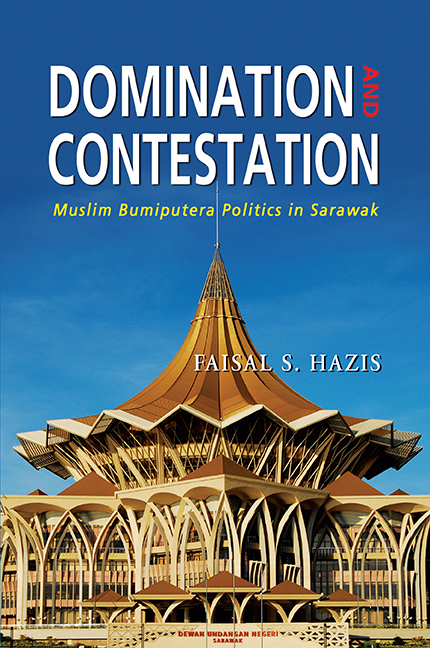Book contents
- Frontmatter
- Contents
- List of Tables
- List of Figures
- Preface
- List of Abbreviations
- 1 Introduction
- 2 State and Social Forces in Sarawak
- 3 The Resurgence of Muslim Bumiputera Politics, 1970–81
- 4 Years of Turbulence, 1981–87
- 5 Consolidation and Domination of the Muslim Bumiputera, 1987–2003
- 6 Muslim Bumiputera Politics in the Post-Mahathir Era, 2003–06
- 7 The Coastal Malays of Southwest Sarawak: A Case Study of the Muslim Bumiputera's Political Domination
- 8 Conclusion
- Postscript
- Appendices
- Bibliography
- Index
- About the Author
3 - The Resurgence of Muslim Bumiputera Politics, 1970–81
Published online by Cambridge University Press: 21 October 2015
- Frontmatter
- Contents
- List of Tables
- List of Figures
- Preface
- List of Abbreviations
- 1 Introduction
- 2 State and Social Forces in Sarawak
- 3 The Resurgence of Muslim Bumiputera Politics, 1970–81
- 4 Years of Turbulence, 1981–87
- 5 Consolidation and Domination of the Muslim Bumiputera, 1987–2003
- 6 Muslim Bumiputera Politics in the Post-Mahathir Era, 2003–06
- 7 The Coastal Malays of Southwest Sarawak: A Case Study of the Muslim Bumiputera's Political Domination
- 8 Conclusion
- Postscript
- Appendices
- Bibliography
- Index
- About the Author
Summary
INTRODUCTION
Between 1963 and 1970, the central state was struggling to impose its presence in Sarawak which was administered by a weak ruling party led by the Iban leaders. Without strong grassroots support and high political aptitude, the Iban leaders failed to adopt the right strategy to bring order and stability, leading to a long-running crisis in the ruling party and widespread anti-government dissatisfaction among the masses. To the central state, the volatility of Sarawak politics posed a threat to the existence of the Federation, especially after the cession of Singapore in 1965. Hence, the central state took a coercive measure by declaring a state of emergency on 15 September 1966, after an earlier attempt to remove Chief Minister Stephen Kalong Ningkan of Sarawak National Party (SNAP) failed. Through this declaration, the central state amended the Constitution, empowered the Governor to call a meeting of the Council Negeri which subsequently passed a motion of no confidence against Ningkan, thus effectively removing him from office. In order to avoid Ningkan's removal being turned into a racial issue, the central state endorsed another Iban leader, Tawi Sli, from Parti Pesaka Anak Sarawak (PESAKA) to fill up the vacant Chief Minister's seat. The elevation of Tawi Sli who was one of the Iban candidates nominated for the post in 1963 did not resolve the political instability in Sarawak especially after SNAP decided to leave Alliance and joined SUPP to establish a formidable opposition force.
After the conclusion of Sarawak's first direct election in 1970, the central state manoeuvred a plan to install a Muslim bumiputera who was highly regarded by the central state leaders as the new Chief Minister. The chosen leader was Abdul Rahman Yakub, a prominent Muslim Melanau law graduate from a Muslim bumiputera-dominated party, Parti Barisan Anak Jati Sarawak (BARJASA). The appointment of Rahman as Sarawak's third Chief Minister marked the resurgence of Muslim bumiputera political dominance which had been momentarily broken by the Iban leaders. This chapter argues that the elevation of Rahman was the result of the central state's strategy of using Sarawak's social forces, specifically the Muslim bumiputera intelligentsia who later transformed themselves into strongmen-politicians, as a means to dominate the populace.
- Type
- Chapter
- Information
- Domination and ContestationMuslim Bumiputera Politics in Sarawak, pp. 71 - 112Publisher: ISEAS–Yusof Ishak InstitutePrint publication year: 2011

